|
|
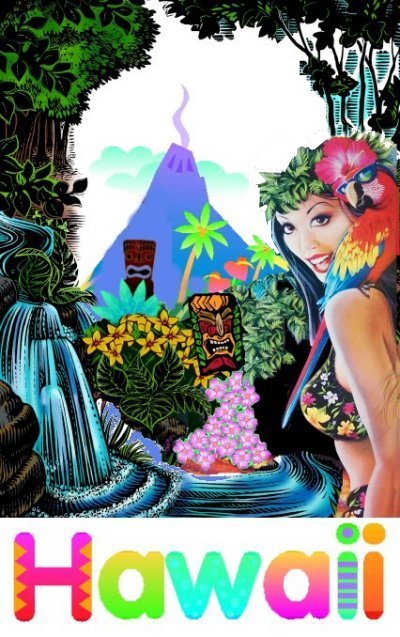 |
Join Rick and Marla for an 11-Day Cruise Trip aboard the
Celebrity Solstice, September 23 - October 04, 2013.
The Solstice is rated a 5-Star ship, one step above all
previous ships we have sailed on. It is a relatively new ship,
hitting the waves in 2008. We will sail in the lap of luxury.
This unusual trip is
actually two cruises in one. We fly in to enjoy the pleasures
of beautiful San Diego, California. Then we will take a two
hour bus ride down to Ensenada, Mexico south of the border.
Celebrity cruise line schedules these buses. Thanks to an 1886
law meant to protect the American shipping industry, each cruise
ship must visit a foreign port; this detour to Ensenada is RCCL's
way of dealing with the law.
From Ensenada we depart
for Stage One, a 5 day ocean voyage across the Pacific.
This is an unusual feature. Most people fly to Hawaii, but us.
We have five days to sing, dance and laugh aboard the luxurious
Solstice. From there we begin Stage Two, our
cruise through Hawaii. We start with two ports of call on the
Big Island plus an evening passage to observe Kilauea, a spectacular
live volcano that pours hot red lava into the ocean. Next we
have two days at Maui. From there we cruise to Oahu. If
you need to go home a day early, you can leave on Thursday, October
3rd. However most of us will more likely spend Monday seeing
Honolulu and the surrounding areas, then use our ship as a floating
hotel... no extra charge.
The following day we can
either fly home or get a hotel. Anyone who wishes to explore
Oahu further or see Kauai or Molokai is under no constraint to go
directly home. Why not stick around a while longer?
Cruise Pricing: All rates are per
person double occupancy
|
Inside
Category 10 Deck 8 |
$1150 |
|
Oceanview Category
8 Deck 3 |
$1240 |
|
Balcony Category
2B
Deck 7 |
$1495 |
|
Balcony
Category
1C Deck 8 |
$1535 |
|
Departing from Ensenada,
Mexico - Monday, Sept 23 at
11:59 pm (plenty of time to get to the ship!)
Cruise 5 days to cross Pacific -
Tuesday
(Sept
24), Wednesday, Thursday, Friday, Saturday (Sept 28)
|
Hilo, Hawaii
- Sunday, September 29th -
Arrive: 8 am
Depart: 6 pm
|
Mount Kilauea - Evening
Sail by to see the lava
|
Kailua Kona
- Monday, September 30th -
Arrive: 8 am
Depart: 6 pm
|
Lahaina,
Maui -
2 days! Tuesday,
Oct 1st - Wednesday, Oct 2nd,
Arrive: 8 am Tues Depart: 6 pm Wednesday
|
Honolulu, Oahu
-- overnight stay on Thursday, Oct 3rd -
Arrive 8 am.
Disembarkation on Friday, Oct 4th
|
|
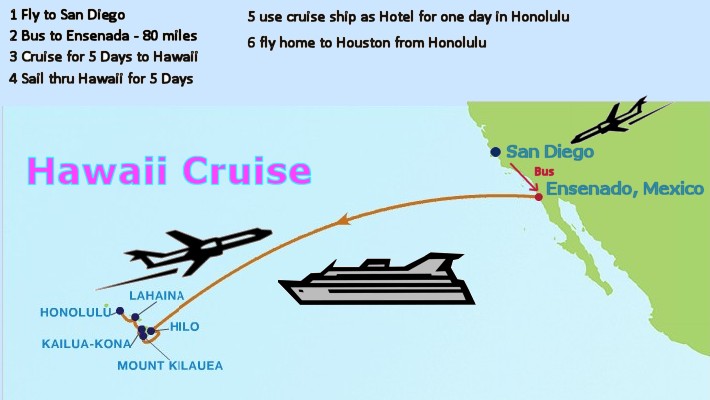 |
| |
|
|
Group Travel Agent --
Marla Archer
Email
questions to marla@ssqq.com
Phone questions to 713 862-4428 |
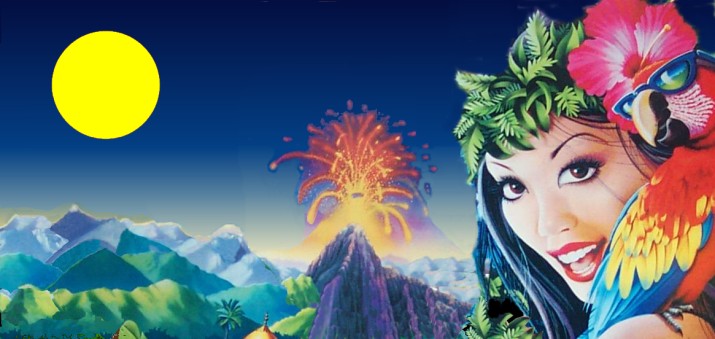 |
| |
Cruise
Pricing as follows: |
|
| |
Inside
Category 10 Deck 8
Oceanview Category
8 Deck 3
Balcony Category 2B
Deck 7
Balcony Category 1C Deck 8 |
$1150
$1240
$1495
$1535 |
| |
| |
All pricing is per person
double occupancy |
Transaction Rules |
| |
|
|
| |
Please email
your
Registration Form to
marla@ssqq.com |
| |
|
| |
FINAL PAYMENT DUE BY JULY 1ST, 2013
|
|
|
|
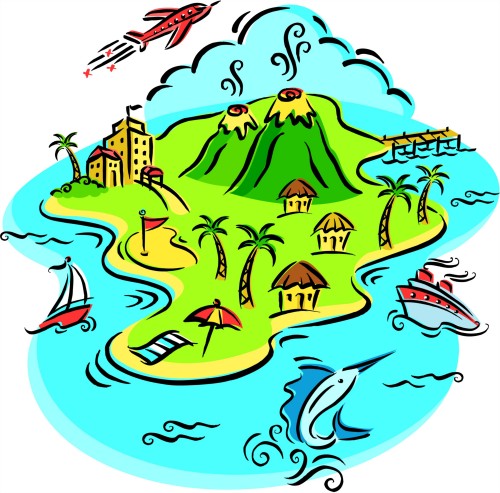 |
The
Kilauea
Volcano
The very first of Stage
Two will allow us to visit Kilauea in two different ways.
During the day, if you wish, you can actually hike up to the volcano
and take a look.
Then that same night, our ship will pass by the
volcano to give everyone a spectacular view of the continual lava
flow as it enters the ocean.
Every night, the slithering lava flow lights up the
night sky. This makes
for quite a show as the cruise ship
sails past.
Kilauea is currently
the Earth’s most active volcano. It is the most recent of a series of
volcanoes that have created the Hawaiian archipelago of islands over
eons of activity.
Kilauea has been in a
state of almost constant eruption since 1983. The volcano only rises
4,090 feet above sea level, but it is still growing. There were 45
eruptions of the volcano in the 20th century alone and Kilauea
ejected lava into the air as recently as March of 2011.
Kilauea is only
volcano in the world that is simultaneously active enough to be
interesting, docile enough to be harmless, and carefully monitored
enough to be approachable.
As a result,
the volcano is a major tourist draw.
Kilauea is visited by roughly 2.6 million
people annually, most of whom proceed up the volcano from the
recently revamped Kilauea Visitor Center near the park entrance. A
number of hiking trails, points of interest, and guided ranger
programs exist, and the Chain of Craters Road, Hilina Pali Road, and
Crater Rim Drive provide direct access to the volcano.
To learn more about
Kilauea and view 32 amazing photos, click
Kilauea Volcano
|
Waikoloa
Village
On the second
day of Stage Two, Rick and Marla invite you to join them for
a trip to the beautiful Waikoloa Village located 18 miles
north of Kona.
Waikoloa Village is a
luxurious Hilton resort located on Hawaii's Big Island. At 62
acres, it covers an enormous area the size of nearly 60
football fields laid side by side.
Waikoloa Village
is known for its lush foliage, wonderful view of the ocean,
and its beautiful system of interlocking swimming pools and
lagoons.
What makes
Waikoloa interesting is that the resort represents a great
human triumph over the cruelty of nature. Behind its
incredible beauty, Waikoloa has a secret. Waikoloa
Village was built right on top of a lava field!
Just 30 miles in the distance, the enormous dormant volcano
Mauna Kea looms over the resort like an ancient sleeping monster.
Waikoloa was
built right on top of the path the burning lava once took on
its way to the ocean.
To learn more, click
Waikoloa Village.
|
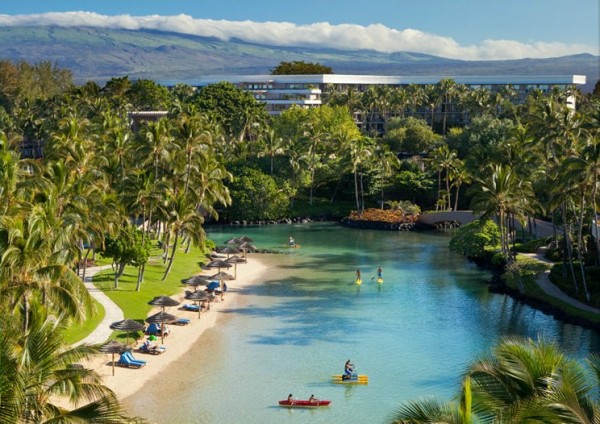 |
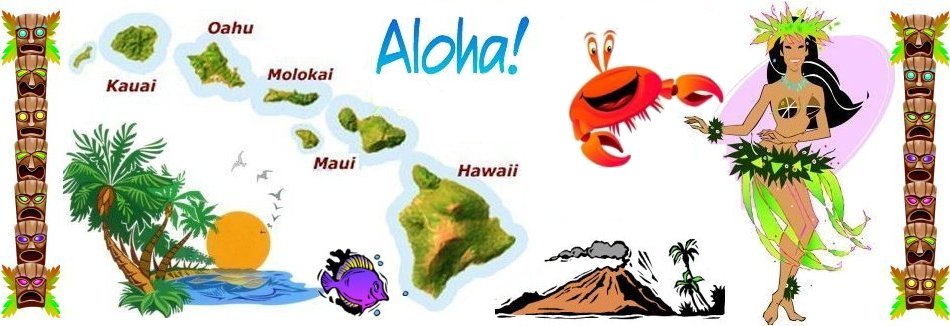
|
Hawaii - The
Big Island |
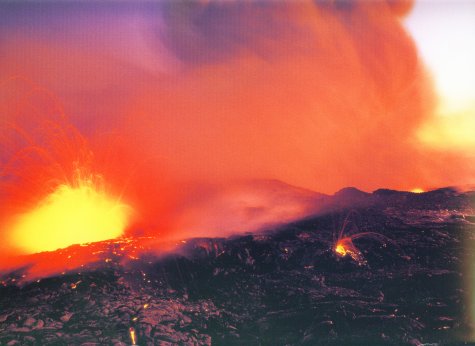
Mount Kilauea, Big
Island
|
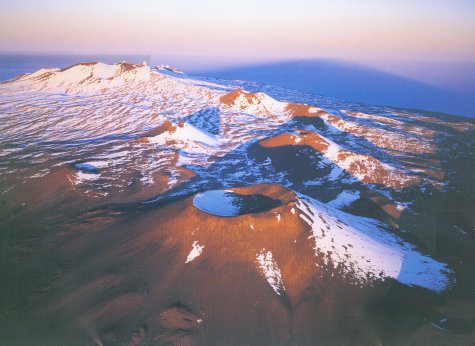
Mauna Kea, Big Island
|
|
|
Hilo, Hawaii |
The Evening Sail by Mount Kilauea |
We
arrive at Hilo on the Big Island at 8:00 am
on Sunday, September 29th.
Hilo is the capital of this
island. This will be the first of two
days on the Big Island. We will visit Kona the
following day.
The island of Hawaii is the largest of
the Hawaiian Islands, thus its nickname The Big
Island. It is a land
of rare beauty and wonder.
The other nickname of this island is Volcano Island.
The island of Hawaii is 4050 square miles and is home to the
snow-capped, 14000 –foot peaks of Mauna Loa and Mauna Kea.
These immense mountains are part of
the fiery landscape of Hawaii Volcanoes National Park.
But Big Island is hardly a volcanic wasteland. There are vast
macadamia nut plantations, black-sand beaches, and
orchid-filled forests.
Spend the day exploring the wonders of Kilauea Volcano up
close on a walk through Hawaii Volcanoes National Park or
experience the beauty and ferocity of Hawaii’s active
volcano from above on a helicopter ride. You will be in awe
of the incredible beauty and power of this active volcano
and possibly even get a chance to view molten lava.
If you decide to go Volcano
Hiking in Hawaii Volcanoes National Park, go prepared!
It's a 3 mile hike on uneven ground, steep and rocky
terrain. You must have sturdy shoes.
From black lava flows to rainforest &
waterfalls, you'll take in the beauty of Hawaiian nature as
you pass wild orchids, ferns & Kahili ginger plants. Visit a
lava tube, discover volcanic formations & hike out to a
volcanic crater. Hike through rain forests & pass steaming
fissures where lava once spewed
hundreds of feet skyward. Then
take a drive along the Hamakua coast to one of
Hawaii's most impressive waterfalls.
January 3, 2006 marked the 23rd anniversary of the Pu`u `O`o
eruption on the east rift zone of Kilauea Volcano. It has
the distinction of being the longest-lived rift zone
eruption in the 200-year-long historic record of Kilauea
Volcano. It is also the most voluminous and one of the most
compositionally variable in the Kilauea historic record.
This on-going eruption has produced a broad field of new
lava flows that have buried over 117 sq km of the volcano's
south flank and added more than 230 hectares of new land to
the island.
Lavas from this eruption have unfortunately destroyed
several communities and numerous man-made structures along
the south coast of the Big Island of Hawaii, including 189
houses, a National Park Service Visitor Center at Waha`ula,
a church, a store, the Waha'ula Heiau (a 700 year old
Hawaiian place of worship), and many other ancient Hawaiian
sites.
The coastal highway in this part of the Big Island
has been closed since the Nineties as
lava flows covered 14 km of it
with lava now as deep as 35 m.
More recently,
2011 was an exciting year at Kilauea
with 3 eruptions. Most notably was the eruption on
March 5th when lava spewed 80 feet in the air.
The lava rocketed from a new
fissure on Kilauea’s east rift zone, between the Pu'u`Ō`ō
and Napau craters. A fissure is a split in a volcano that
opens in a straight line. The new fissure, called Kamoamoa,
created
amazingly tall lava flows.
In December 2011,
scientists reported their discovery of lava deposited by
Kilauea's most deadly eruption
in recorded history, which killed more
than 400 people in November 1790.
Or if
you prefer, snorkel in the giant tidal ponds of Lava Tree
State Park and experience some of the most extensive and
beautiful coral gardens in the world. Walk through the
tropical botanical garden, where you will see native plants,
giant trees, tropical vegetation and endangered plant
species.
|
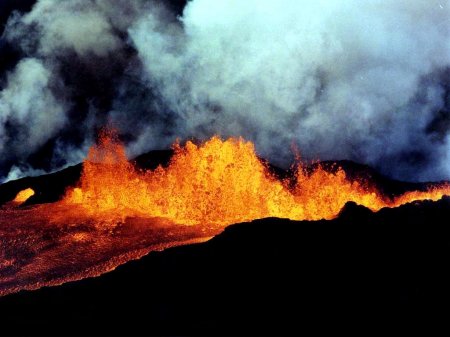
Mauna Loa Eruption, Big Island
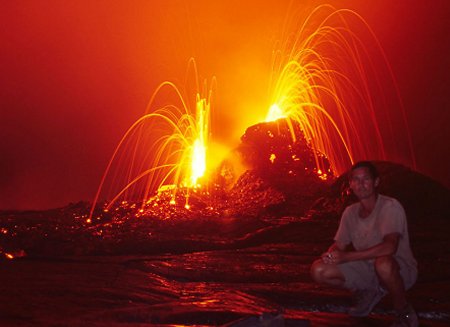
Pu'u'O'o Volcano
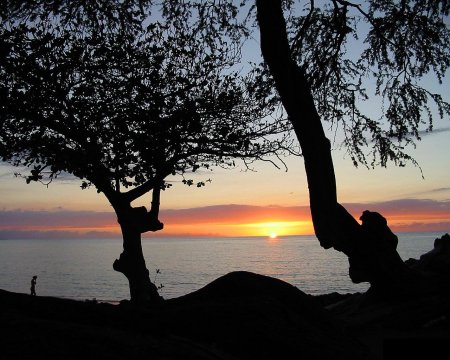
Spencer Beach, Big Island |
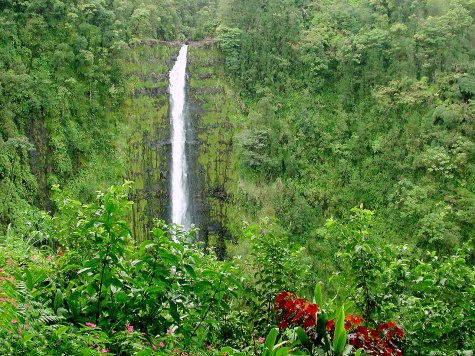
Akaka Falls, Big Island
|
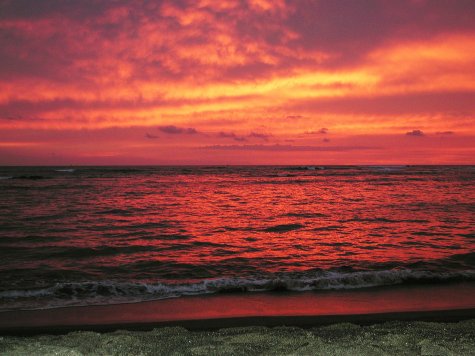
Hawaii Island Sunset
|
|
Evening Sail By
at Mount Kilauea |
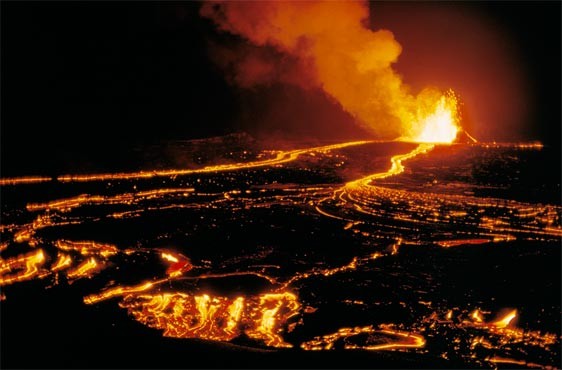 |
One of the highlights of the cruise is our
evening sail by Mount Kilauea.
The
Kilauea
Volcano is the most active and the youngest
volcano of the Hawaiian shield.
It erupts almost constantly from
the
vents on the rift zone and the caldera.
Kilauea has
records of uninterrupted eruption since 1983.
And these are not just little outbursts
either.
Since 1998, the island has grown 560 acres due
to volcanic
activity. Mind you,
this isn't exactly farm land, but it is
still amazing to watch how land must have
been formed in the days before humans even
walked the earth.
Every night, the slithering lava flows light up the
night sky. This makes
for spectacular views from the cruise ship
as we sail past.
Be sure to
bring your camera and get a good spot on deck for the show!!
|
|
|
Big Island -- Kona
|
|
We arrive in Kona at 8:00 AM
on Monday, September 30th for
our second day of adventures on the Big Island.
The Kona Coast is a favorite spot
to visit. Located along Hawaii’s western shore, where the
slopes of Mauna Loa and Hualalai meet the sea, the
Kona Coast is a region of endless lava fields and
golden Pacific sunsets. The clear waters are
perfect for diving, snorkeling, and deep-sea
fishing.
If you prefer to walk, explore dozens of Kona’s
charming and fascinating historic sites. Enjoy
stories of Kona’s colorful characters and the places
they inhabited. Experience the treasures of the
King’s summer palace as well as the beautiful palace
grounds.
Go fishing in the billfish capital of the world.
The calm, deep-sea fishing grounds off the coast of
Kona are teeming with marlin, yellowfin tuna, mahi
mahi, wahoo and short-nose spearfish year-round.
Be sure to get a taste of the local flavor by trying
Kona’s world famous coffee. Just one taste of this
rich, smooth coffee and you’ll want to bring some
home with you.
Kealakekua Bay is famous
in Hawaii for an unusual reason. In 1778 James
Cook was the first European to discover these
islands. the spot
where Captain James Cook lost his life.
On a return trip a year later, Cook was murdered in
1779 by island natives. Tensions began over the
theft of a small boat. However Cook's death
was largely an act of vengeance. The natives
were furious at Cook over the earlier murder of one
of their chiefs by a British lieutenant under his
command.
Today this area is
significantly more peaceful. It is one of the best snorkeling spots on the
island. The area is a state park and conservation
site teeming with undersea life. It is a great
place for both experienced snorkelers and novices to
explore the marine world.
Bring your camera when you visit
Akaka Falls
and Kahuna Falls, two impressive Hawaiian
waterfalls. Both are located at
Akaka Falls State Park,
a short 20 minute
drive north of Hilo where we will
be staying. At the park, you will take a
self-guided, 0.4 mile hike through dense tropical
vegetation to see these two towering Hawaiian
waterfalls. This hike
offers a glimpse into the wonders that Hawaii's
tropical rain forests offer. Breathe in the
fragrance of jungle flowers as you travel along the
short (about ¼ mile) trail to the falls.
Here you can spot a huge
variety of palm trees, banana plants, banyan trees,
bamboo groves, impatiens, and a plethora of vines
worthy of a Tarzan movie as you
walk along the path.
Common wisdom says to visit Kahuna Falls
first. It is the lesser of the two waterfalls
at 400 ft. This amazing waterfalls
will set the stage for the even
more impressive Akaka Falls, which drops 442
ft. into a pool of water below.
Of the two falls in the park,
Akaka Falls with its water falling over a 420 foot
drop, is definitely the
more spectacular. Be sure to walk all the way to the
edge of the path so that you can see the falls from
top to bottom, including the pool below. You will be
a fair distance from the falls so you don't need to
worry about getting wet from spray.
Hamakua Coast is a scenic
drive through former sugar cane plantation lands now
planted with trees and dotted with small farms of
ginger, papayas and many other flowers and foods.
The Hamakua Coast is a stunningly beautiful place
whose history and leisurely way of life are
treasures its communities want to preserve.
One
visit and you'll understand why
the Waipio Valley
is often referred to as the
"Valley of the Kings". It
is the largest and most southern of the seven
valleys on the windward side of the Kohala
Mountains. It is a
mile wide at the coastline and is almost six miles
deep. On both sides of the valley there are cliffs
reaching almost 2000 feet with hundreds of cascading
waterfalls, including one of Hawaii's most
celebrated waterfalls - Hi`ilawe.
Waipio Valley is located along
the Hamakua Coast on the northeast shore of the Big
Island of Hawaii, the Waipi`o Valley is the largest
and most southern of the seven valleys on the
windward side of the Kohala Mountains. The Waipi`o
Valley is a mile wide at the coastline and almost
six miles deep. Along the coast lies a beautiful
black sand beach often used by motion picture
production companies.
On both sides of the valley
there are cliffs reaching almost 2000 feet with
hundreds of cascading waterfalls, including one of
Hawaii's most celebrated waterfalls - Hi`ilawe. The
road into the valley is very steep (a 25% grade). In
order to travel into the valley, you must either
ride down in a four-wheel drive vehicle or hike down
to the valley floor.
Waipi`o means "curved water" in the Hawaiian
language. The lovely Waipi`o River flows through the
valley until it enters the ocean at the beach.
The Waipi`o Valley is often referred to as the
"Valley of the Kings" because it was once the home
to many of the rulers of Hawaii. The valley has both
historical and cultural importance to the Hawaiian
people due to its status as
the most fertile and productive valley on the Big
Island of Hawaii.
|
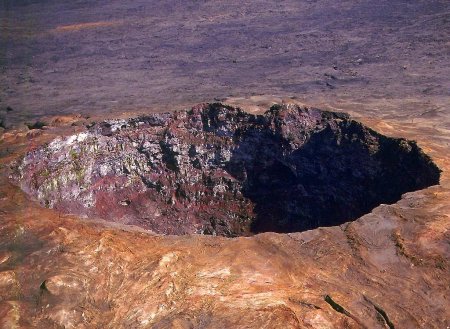
Kona Crater, Big Island
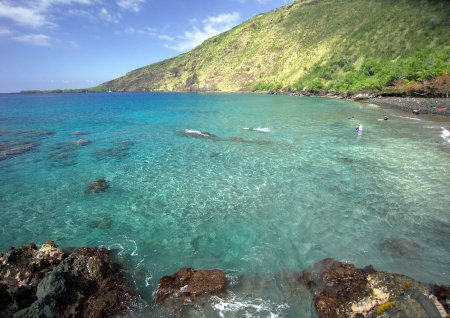
Kealakekua Bay
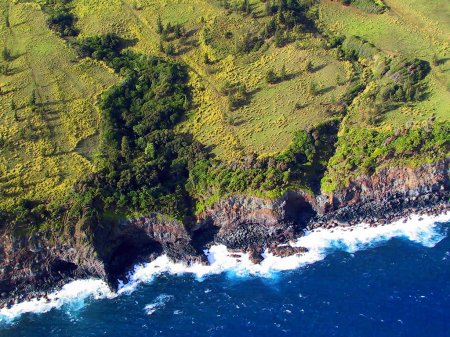
Hamakua Coast
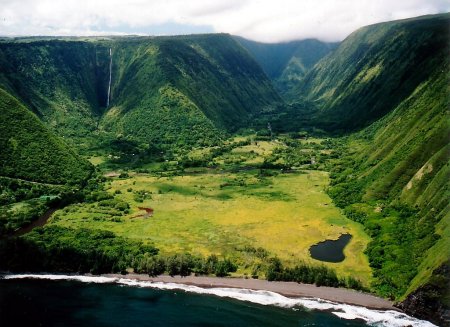
Waipio Valley
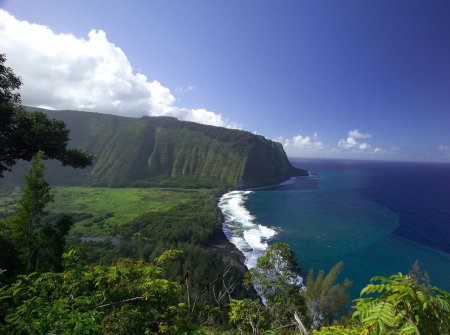
Waipio Valley
|
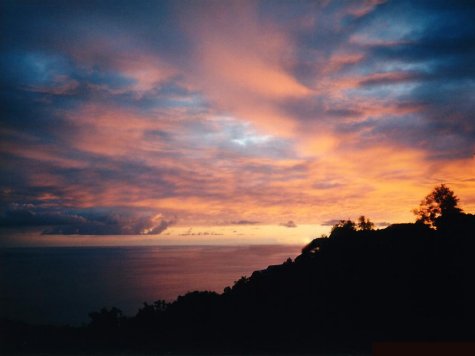
Napoopoo
Sunset, Big Island |
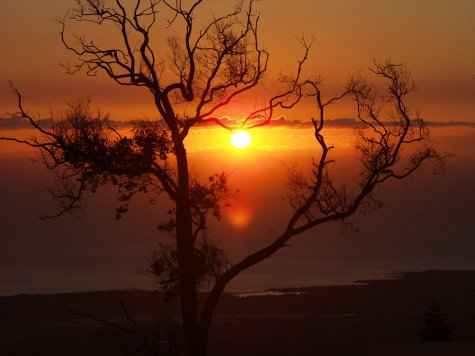
Kaloko Sunset, Big Island |
|
|
|
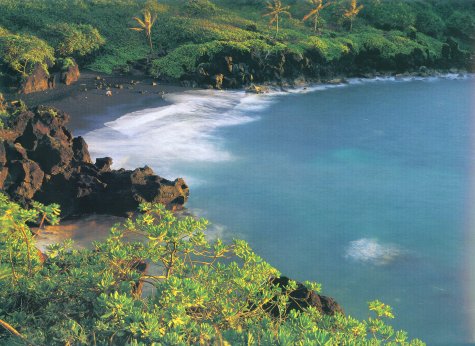
Waianapanapa
State Park,
Maui
|
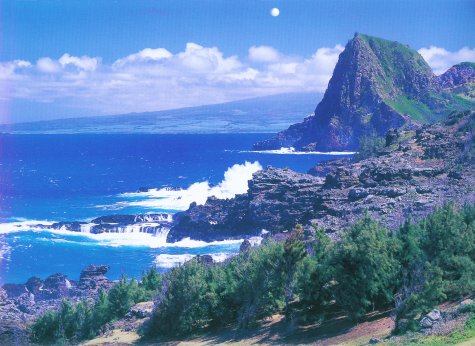
Kahakuloa Head,
Maui
|
|
|
Maui |
|
Maui, Waterfall Island
|
2 DAYS FILLED WITH ADVENTURE |
We arrive in Maui on Tuesday, October
1st at 8:00 am.
We have two
full days to enjoy the second largest Hawaiian island. The
ship doesn’t depart until 6:00 pm on
Wednesday.
Maui is known for its numerous beaches, rain forests,
waterfalls, and eucalyptus groves.
Be sure to visit the Haleakala National Park with its 30
mile trail system full of spectacular plants and foliage.
Don’t miss the view from Haleakala, the largest dormant
volcano in the world. The scenic journey to the top takes
you through upcountry Maui. The view from the top at 10,032
feet is magnificent
as you can scan the Pacific in every direction.
Mark Twain once wrote, "It was the most sublime spectacle I
have ever witnessed and I think the memory of it will remain
with me always."
Maui has many beautiful
attractions. One in particular is the
Maui Tropical Plantation.
This 60 acre working plantation is a fun way to discover
more about Hawaii's rich agricultural history. A tram
ride allows you to visit every corner of the grounds.
There are hints of many goodies to be sampled.
Another popular place to visit is the
Iao Needle (pictured at right), a
2,250 foot cinder cone pinnacle that pierces the clouds.
This state park features lush mountain terrain.
You can combine the impressive natural beauty of Iao
Valley State Park with a visit to the new Maui Ocean Center.
This way you can discover the mysterious world that
lies hidden below the surface of Hawaii’s oceans.
Rent a car and travel the winding roads along the famed Hana
Highway and take in the spectacular scenery: lava cliffs,
tumbling waterfalls, and tropical hillsides.
For 35 miles the Road to Hana twists
through jungle, over bridges, past waterfalls, and along
cliff edges. It slices through a landscape featuring
canyons and gulches carved out by the many streams.
Travel along the West Maui Mountains to Kahakuloa
Valley, home to families who live and practice the ancient
customs as their ancestors have for over 1500 years.
Makena Beach....what a gem! Wide, pristine,
expansive.... and even though many more people are enjoying
its exquisite beauty now than in the days not so long ago
when you had to drive down a long dusty desert road to get
there. However, even though there are now parking lots,
port-a-pottys, and luxury resorts within easy reach, that
element of the wild still lingers. ANYTHING can happen
at Makena....famous for it's "clothing optional" status.
Since we have two full days in Maui, why not travel to
Lahaina? After Honolulu, Lahaina is Hawaii's
second best known town. You can enjoy dozens of
shops, restaurants and historical sites.
It is a superb walking town! The drive is only
45 minutes each way.
Lahaina is best known as a whaling village. In the
early 1820s
New England whaling ships began visiting. The
missionaries were soon to follow. By the 1840s Hawaii
had become the principal forward station of the American
whaling fleet. Lahaina was the favorite port of call
because of its protected offshore waters. The whaling
ships have long disappeared from Lahaina, but this
waterfront town continues to preserve the lively spirit and
look of the salty 1800's.
Waianapanapa State Park is a 122-acre
preserve that encompasses a lovely
black sand beach, dramatic sea caves, natural stone arch,
campground, hiking trails, and remnants of the first road
built around swimming due to strong currents and a rocky
reef. Black sand is the
result of lava the island, the old King's Highway.
The black-sand beach is lovely but dangerous for flowing
into the ocean and shattering when it comes in contact with
the cool water. The volcanic pieces are then smashed against
each other and the shoreline with each wave, thus creating
the black sand. There is a stone bridge, and, a short hike
away, the huge smooth volcanic tubes or caves.
|
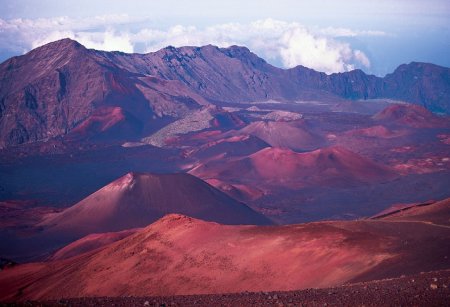
Haleakala,
Maui
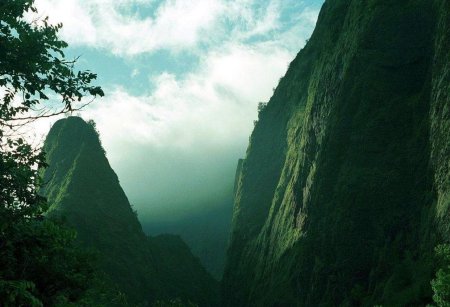
The misty Iao
Needle, Maui
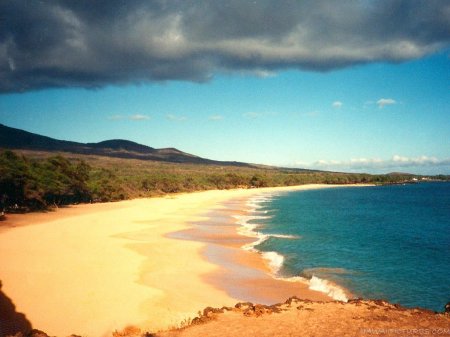
Makena Beach, Maui
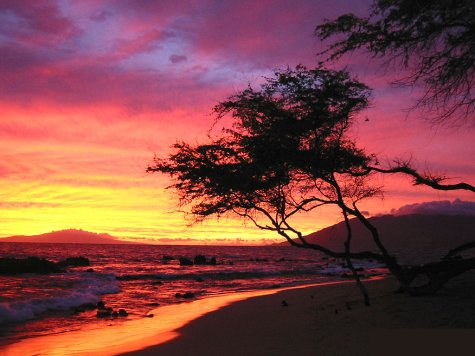
Kamaole Beach, Maui |
|
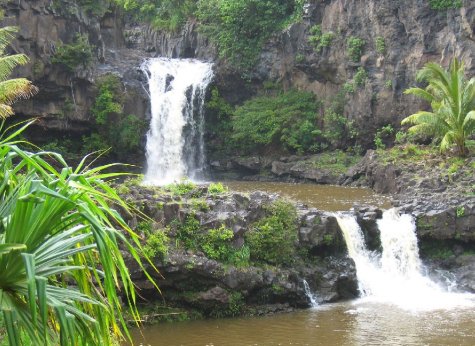
Sacred Pools,
Maui |
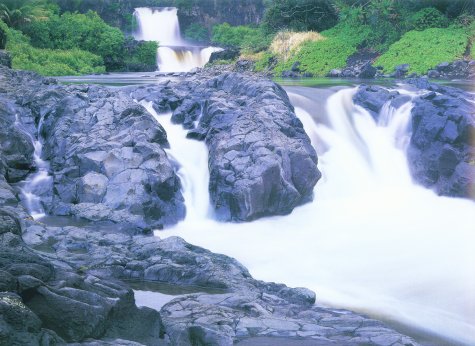
Haleakala National
Park, Maui |
|
|
|
|
Oahu, Surf Island |
|
Our cruise ends in Honolulu, Hawaii.
We arrive on Thursday, October 3rd at 8:00 am, but we are
given the opportunity to use the ship as a floating hotel
for the evening.
Disembarkation is the following day.
This gives you
the whole day to explore Oahu to its fullest, after all, it
is the most populated of the
Hawaiian Islands. Or stay a day or two
after
to explore Hawaii’s most populous and famous island
in even greater depth.
Where else can you find monstrous surfing
waves, a multi-billion dollar skyline, high tea at the
beach, and stunning mountains complete with mist, rainbows,
and waterfalls?
Honolulu is
located in a beautiful protected bay with the stunning
Diamondhead Volcano guarding its flank. Honolulu has been
the commercial, political, and cultural center of the
Hawaiian Islands since the 1800s.
Honolulu is a cosmopolitan center that
is renowned for its fabulous
hotels, shopping, restaurants,
the world-famous
Waikiki Beaches and breathtaking views
in every direction.
By far the most popular destination in
Honolulu is Pearl Harbor and the Arizona Memorial.
This destination serves as a
moving tribute to this important
historic event. The USS Arizona has rested in its
watery grave at Pearl Harbor since December 7, 1941. The
overturned hull of this battleship entombed 1,100 sailors
caught unaware by the Japanese bombs that sank this mighty
ship and brought the United States into World War II. The
memorial was built in 1961 as a tribute to all the men and
women who lost their lives on that historic day. The
memorial is 184-feet long and carefully crosses over the
Arizona's mid-section. Openings along the both sides of the
memorial afford a dramatic view of the ship resting on the
floor of the harbor. A marble-walled chapel at the far end
of the memorial lists the names off all the sailors entombed
here.
Maybe you want to put on your swim suit
and head down to Waikiki Beach. Hawaiian for
"Sprouting Water", this is one of the most famous beaches in
the world. The two mile stretch of white sand coast is
fronted by hotels and tourist facilities. The area is
excellent for swimming, surfing, boogie boarding, catamaran
and outrigger canoe rides. It is
a perfect beach with crystal clear water, backed by lush
mountains, laced with clouds and rainbows, as well as the
luxurious hotels which line the shore. You can watch
the surfers or maybe appreciate the local beauties on the
beach.
Another excellent suggestion is to rent a car and
check out the a wide variety of
interesting destinations.
You can the visit the North
Shore with its fabulous surfing waves.
The waters of North Shore feature the famous Bonzai
Pipeline. This coastline is blessed with pristine
white sand beaches and its waters form perfect waves and
tubes. The high surf's waves may reach heights of up to
twenty-five feet plus. The surf can rise quickly going from
two feet to twenty-five feet high and larger during the
course of a day. As a result this area is known for
its world-class surfing. There is also body boarding,
body surfing, great swimming, snorkeling and scuba diving in
the Summer months. And the scenery on the beach itself
is often quite inviting.
The exact origin of surfing is unknown, but most historians
believe that the Polynesians were already well versed in the
sport by the time they migrated to the Hawaiian Islands some
2,000 years ago. Early Hawaiians called surfing "he‘e nalu,"
which literally translates to "wave sliding." During this
time, only high-ranking ali‘i had access to the best surf
spots. King Kamehameha himself was said to be an avid and
skilled surfer.
Go for a swim or snorkel at
Hanauma Bay. Formed during Oahu’s
last eruption, the area is now a marine preserve with
extensive underwater life.
Hanauma Bay is a "curved" bay
that was declared a protected
marine life conservation area and underwater park in 1967.
Hanauma Bay is the very best beach area if you are new to Scuba
diving or snorkeling with a diversified population of fish
and a rich coral reef. The bay floor is the crater of a
volcano that opened up to the ocean when the exterior wall
collapsed. There is a large sandy beach perfect for
sunbathing and there are several hiking trails leading to
breathtaking lookouts. The bay provides some protection
from large ocean waves and allows swimmers a terrific
opportunity to view the reef life in a safer, protected
environment.
A favorite thing to do is to visit the hulking
dormant volcanoes Diamond Head and Koko Head.
Diamond Head looms large over the Waikiki. Actually named Le’ahi by Hawaiians, it received its well known name in
the late 1700's when British seamen saw calcite crystals
sparkling in the sunshine and thought they had found
diamonds. A hike to the top of Diamond Head takes about an
hour over a well-worn path. The summit offers a spectacular
360-degree view of Oahu and is a must trip for photography
enthusiasts.
Definitely check out the fabulous Waimea
Falls Park. This 1800 acre park features botanical
gardens, kayaking, cycling, and of course a fabulous
waterfall.
Waimea Falls is located in the beautiful 1800
acre Waimea Falls Park. In ancient times, the Hawaiians
believed that Waimea had healing powers and they would bring
their wounded soldiers to the waterfall and lay them in the
water for healing. The water has a reddish tint, due to the
iron oxide found in the volcanic soil that flows down from
the mountains by the Waimea River.
Another interesting place to
visit
is the Polynesian Cultural Center,
the only place in the world where you can experience all the
islands of Polynesia in one place.
Watch natives in each village demonstrate crafts and skills
such as creating clothing from bark, stories through dance,
baskets with leaves, and fire by rubbing sticks. During
feature presentations you'll hear intriguing descriptions of
cooking methods, transoceanic travel, and the preservation
of traditions and history without a written language.
A very popular destination in Honolulu is the Iolani Palace
pictured at right. This is the only Royal Palace on US
soil. The Iolani Palace was constructed in 1882 during
King Kalakaua's reign. King K and his sister
Liliuokalani (Lily to her friends) lived in the palace
holding royal court from 1882 to 1893 as well as lavish
balls and banquets. They met a sad end however when in
1893, a group of American businessman staged a successful
coup d'etat ending the monarchy.
|
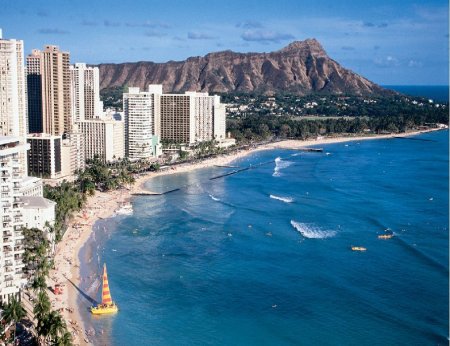
Honolulu with Waikiki Beach and Diamondhead
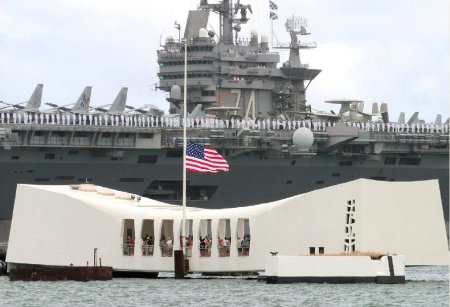
Pearl Harbor
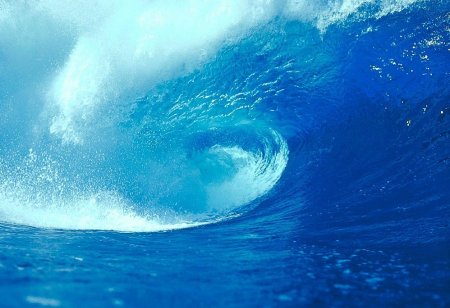
Bonzai Pipeline, North Shore, Oahu
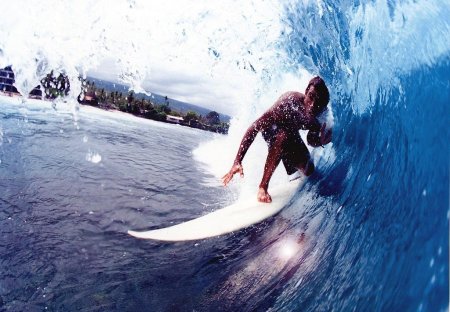
Surfing at the North Shore
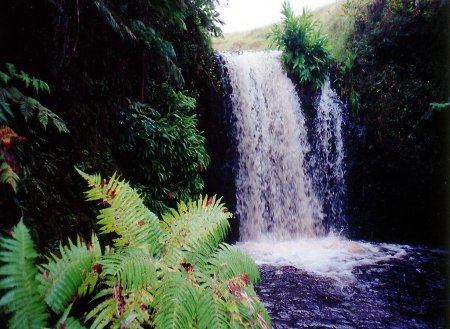
Waimea Waterfall, Oahu
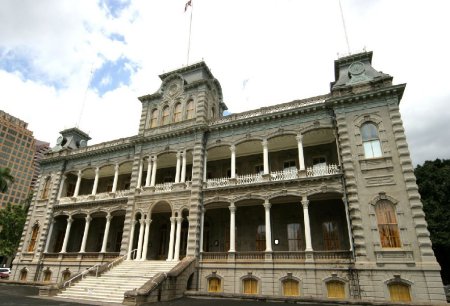
Iolani Palace, Honolulu
|
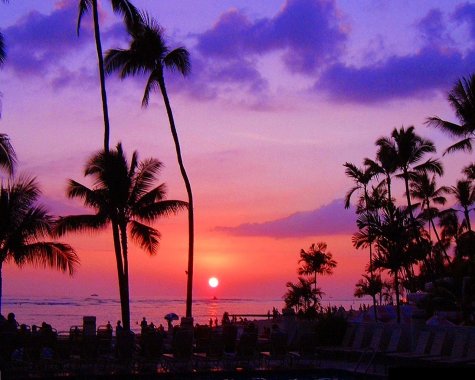
Waikiki
Beach, Oahu
|
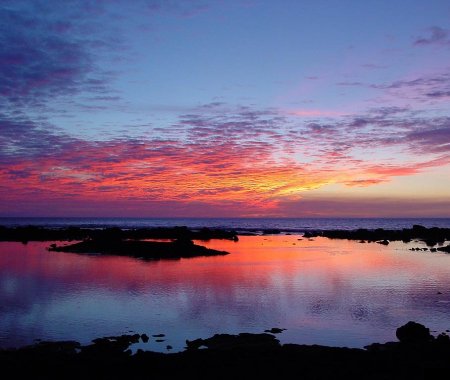
North Shore Sunset,
Oahu
|
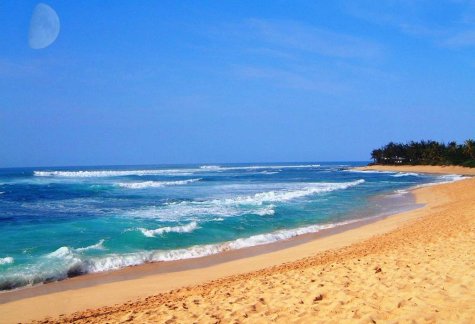
Sunset Beach, Oahu
|
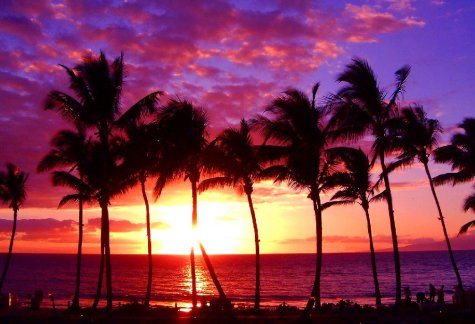
Hawaiian Sunset, North Shore, Oahu
|
|
|
About the Celebrity Solstice
|
Marla's Note:
The Solstice is a Five-Star Ship. It is the most
luxurious ship we have ever sailed on.
As I read the reviews of the
Celebrity Solstice, I smiled when one
person suggested the Solstice should be avoided
by any people who prefer whimsical
decor plus singing and dancing
waiters. This is a veiled reference to
another cruise line.
I am really looking forward to
taking a cruise where I can carry on a conversation
and enjoy my dinner without being interrupted by dancing
waiters just at the time my meal is served.
The Solstice is
completely about elegance. No other word describes it
more. First class all the way.
This is my kind of ship!
|
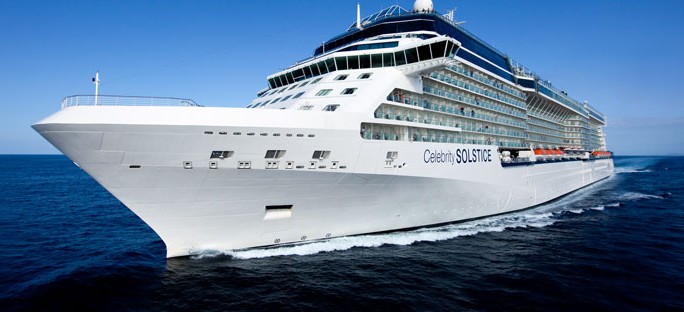 |
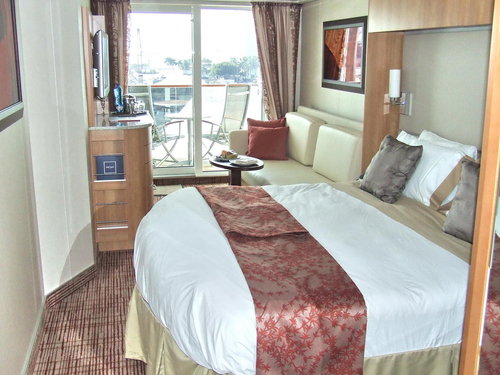 |
Celebrity has staked its reputation on
finding world-class architects and designers who have
created a new benchmark in cruise ship design. Every inch of
the ship was created for comfort. As
a simple example, your
bathroom will be a pleasant surprise.
For starters,
the showers are 25% larger
than the average cruise ship. In
addition, there is a curved acrylic shower door
that is superior to the typical
shower curtain.
You will
enjoy the spaciousness and contemporary styling of the room
in general. The bathrooms are actually large enough for two
people to get ready at the same time. Imagine
that! There is ample storage
space and Bath products, such as shampoo, conditioner, soap
and lotion, are provided.
Storage space is excellent, with
many nooks, crannies and cubbies to store stuff, in addition
to the normal closet shelves and hanger bars. Other
amenities are typical: robes, safes and
refrigerator/mini-bars. Even in a cabin studded with
high-tech electronics, the mini-bar accounting is handled by
ticking off items on a usage list (thankfully) rather than
by one of those automatic refrigerator sensor thingies.
|
Each cabin has LCD flat-screen
television interfaced with a Mac mini computer.
This state of the art system allows passengers
to book reservations, services,
and excursions; examine their accounts; check menus.
You can also watch on-demand entertainment in every
cabin. For those who
wish to leave their laptops at
home, you can access the Internet
in-suite by using their
stateroom's keyboard and remote control.
|
Solstice's most distinctive feature is
definitely the Lawn Club, a half-acre of real grass perched
at the very top of the ship and offering a quiet,
country-club feel.
Guests can play croquet, putt
around some golf balls, play a game of bocce, or
even take a little picnic.
Surely with five
days at sea our group will find time to have a putt-putt
tournament.
At one end of the space, the
world-famous Corning Museum of Glass has created a studio to
present Hot Glass Shows, in which master artisans explain
the art of glass-blowing during creative, high-energy
performances centered around creating a finished vase, bowl,
or other item.
|
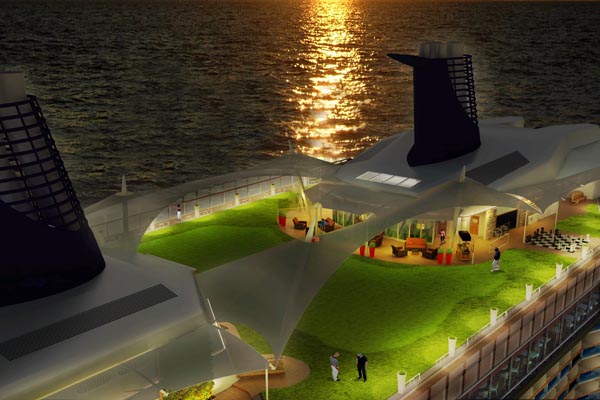 |
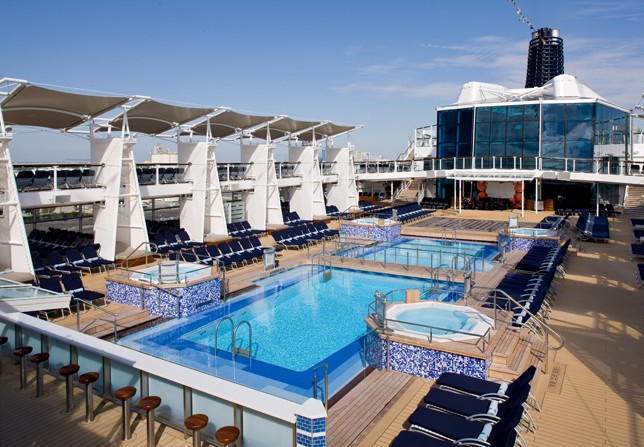 |
The pool deck on
the Solstice is one of the most serene and
resort-like in the cruise industry.
It
features two pools
surrounded by 25-foot A-frame canopies that have luxurious
day beds at their bases and large cantilevered awnings up
top, providing shade for chaise lounges spread out along two
decks.
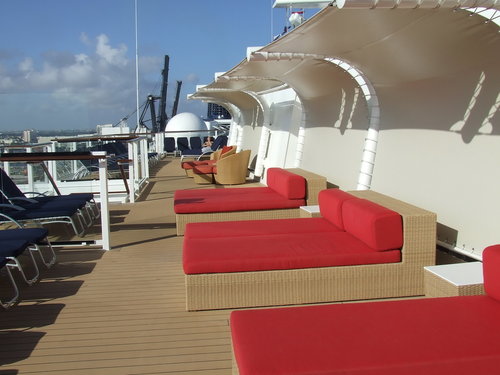 |
| |
|
Forward of the pools is a glass-ceilinged,
adults-only Solarium.
This spacious area
offers a lap pool, cushioned teak lounge
chairs, and an atmosphere
that is sure to calm any jangled nerves from losing the putt-putt
tournament.
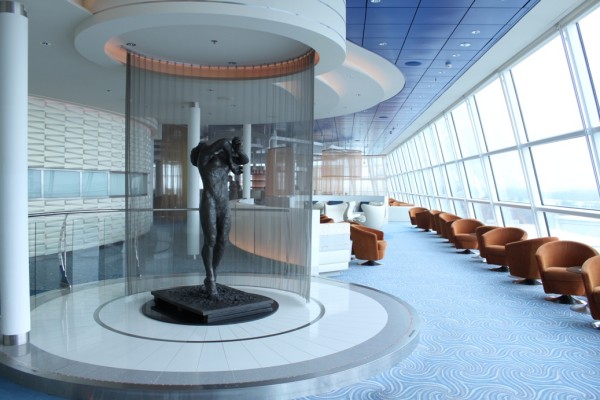
|
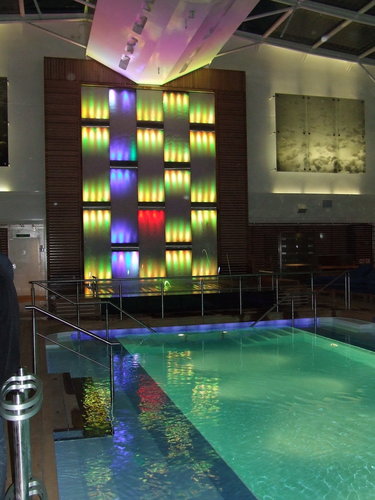 |
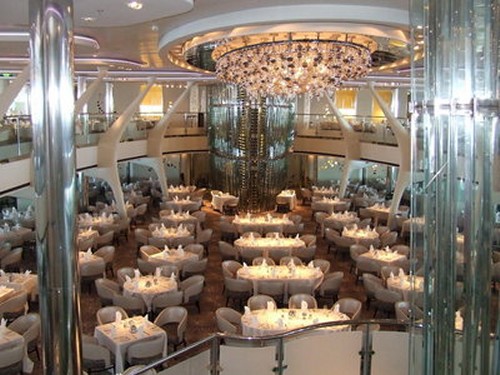 |
The towering, airy Grand Epernay is
the ship's main dining room, spanning two decks at the aft
end of the ship. The room is bright, and light in tones with
ample use of the ship's signature design element, glass. In
fact, instead of a wine cellar, one end of the dining room
is accented with a two-story glass wine tower, replete with
tall ladders to reach bottles at the highest levels.
The restaurant feels spacious.
No one can possibly feel crowded. There
is ample room to navigate between tables, and the room's
openness, combined with extensive carpeting on the floors,
results in a tolerable noise level.
Our dining will
be at 6 pm. Service is said
to be prompt, attentive, helpful and friendly.
|
The
Oceanview Cafe is the casual dining area.
It is a
multi-station buffet for breakfast and lunch.
If necessary, it can also serve as an open-seating
alternative venue for dinner.
For example, we
have an overnight stay in Maui. This allows you to
return to the ship anytime you wish. If
you come back to the ship too late to be seated in the Grand
Epernay, this area is a nice backup.
Other offerings include ice cream,
pizza and pasta, sushi, afternoon tea and late night snacks
(from 9:30 p.m. to 1 a.m.), all without additional charge.
The
Oceanview's layout is excellent,
featuring many serving and prep stations situated as
islands in the middle of the room rather than stretched
along the walls.
The result is a dependably
uncrowded, spacious operation offering an extensive number
of choices. Perhaps this will be our meal time hangout for
breakfast and lunch.
|
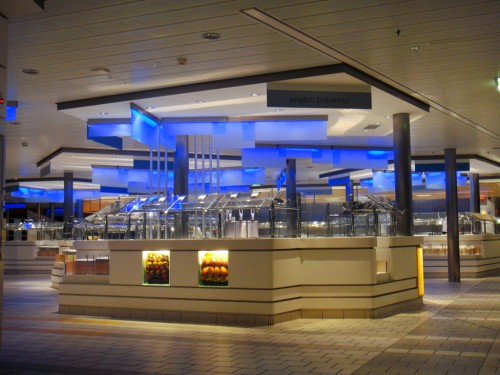 |
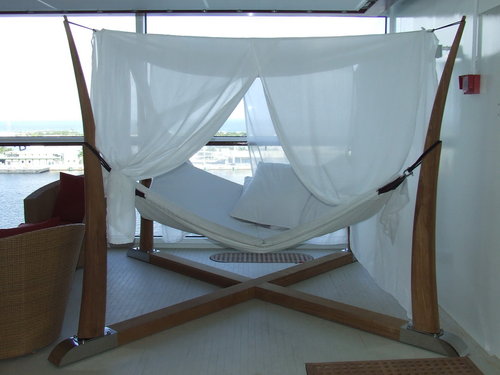
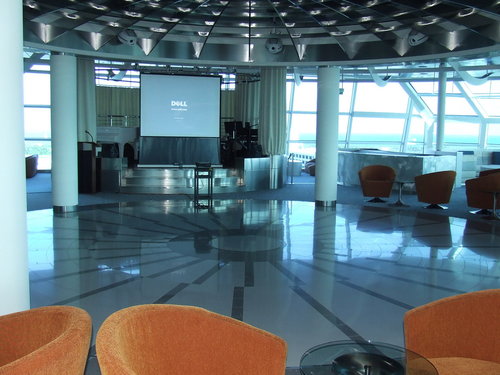 |
As the pictures
suggest, the Solstice is a special ship. It is a
large ship about the size of the Carnival Conquest that we
have sailed on many times. It holds 2,800 passengers.
Royal Caribbean
has three tiers. Azamara is the elite end while
Celebrity is said to be one cut above the regular RCCL
ships.
Considering all
Royal Caribbean ships that we have sailed on to date...
Serenade, Brilliance, Navigator, Rhapsody, Radiance, Jewel,
Vision... have been excellent, tastefully decorated ships, a
"cut above" simply means we will be even more spoiled than
usual.
We will enjoy award-winning
cuisine, superlative service with attention to detail,
spacious accommodations and unique
shows in a state of the art theater.
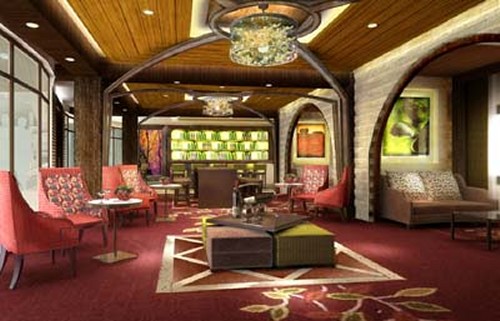
|
|
| |
|
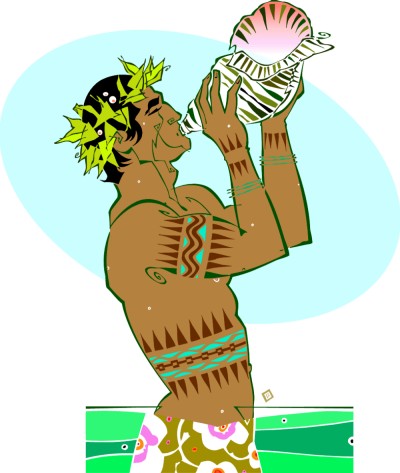 |
Celebrity
Solstice versus Pride of America
Marla's Note:
One question
sure to be asked is "Gee, Marla, why did you select an 11 day
cruise? Why not cruise on the Pride of America for 7
days like we did in 2007?"
Pride of America's rates have
doubled
since we sailed in 2007. Five years ago we advertised
an Inside Cabin for $750. Today an Inside Cabin on Deck 4
sells for $1500. Today's rate for a POA
Oceanview Cabin on Deck 4 is $2000. A POA Balcony Cabin on
Deck 7 is $2125.
Now compare
those totals to Solstice. You are paying $350
to $700 less for more time on a better ship!
In addition,
there are savings on air fare using San Diego. I might add
that San Diego is a wonderful place to visit with all kinds
of interesting things to do in this beautiful city by the
sea. As an added
savings bonus, we are allowed to use the ship for hotel accommodations
on our last night in Honolulu. You would otherwise expect to
pay at least $200 for a quality hotel.
I realize this trip isn't for everyone.
After all, not everyone
can get this much time off from work. But for those who can,
this vacation is an incredible value! When you add
the cruise savings, hotel savings, and airline
savings that were a bonus by sailing on the 5 star Solstice,
you can see why I made the decision I did.
Ask
yourself this - why would you want to pay considerably more
to sail on a 3 star ship for only 7 days?
Instead of the grueling direct flight to Hawaii, we get five
additional days of exquisite pleasure at sea.
This trip means a better ship and a longer vacation for less
money!!
|
|